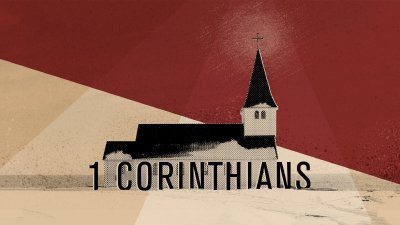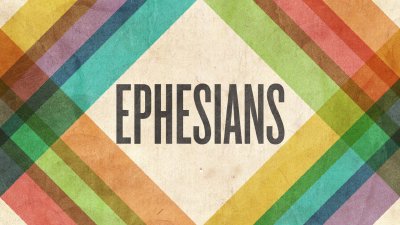


Epistles: Part 1
Romans - Colossians
Romans: Part 1
The Book of Romans is a four-part explanation of the Gospel message written by Paul to the Church in Rome. Since Adam, humans chose to live sinful and selfish lives. Paul shows how Jesus created the new covenant family of Abraham through his death and resurrection and the sending of the Spirit. The people of Israel tried to obey God and follow the Law, but they didn't succeed. Only faith in Jesus' death and resurrection can justify humanity and fulfill God's promise to create a covenant relationship with His people, the descendants of Abraham. Through Jesus, God creates a new covenant family that includes Jews and gentiles who are unified as they love and forgive each other. Even though people continue to reject Jesus, God uses their rejection to expand His family and grow the Church.
1st Corinthians
Paul shows the new Christians in Corinth that all of life's most complex problems can be seen through the lens of the gospel. 1 Corinthians challenges believers to examine every area of life through the lens of the gospel. Specifically, Paul addresses divisions, food, sex, worship gatherings and the resurrection. He reminds believers that the Church is not a popularity contest, followers of Jesus cannot compromise when it comes to sexual integrity, the core principle of worship gatherings is love for others, and the resurrection gives us a reason for unity, motivation to maintain sexual purity, ability to love other people more than ourselves and ultimate hope for victory over death. Our belief that Jesus was raised from the dead makes the gospel more than moral advice or a recipe for private spirituality. It opens a whole new reality for every area of our life.
2nd Corinthians
Paul resolves his conflict with the Corinthians by showing how the scandal of the crucifixion turns our value systems upside-down. Paul addressed problems in the Corinth church in 1 Corinthians, but many rejected his advice. This grieved Paul as he had spent a great deal of time with the Corinthian church. He followed up with a painful visit and then sent them 2 Corinthians, a letter that assured them he forgave and loved them. After reading the letter, many church members repented and embraced the letter's message. Essentially, it challenges believers to see life through the paradox of the cross. Because of the cross and God's Spirit, Jesus' followers receive power to live transformed lives. They become equipped to take up Jesus' cruciform life and make it their own. Through the cross and resurrection, believers may live differently and model the values God desires, including generosity, humility, and weakness.
Galatians
Paul challenges the Galatian Christians to stop allowing controversial Torah observances to divide their church's congregation. The Book of Galatians reminds the Church to embrace and follow the gospel message of the crucified Messiah. The requirement for non-Jewish Christians to become Torah observers and be circumcised or eat kosher misses the point. Jesus alone fulfills the laws of Torah and justifies believers. When people trust in Jesus as Messiah and put their faith in Him, His life, death, and resurrection become theirs. They are new creations, free from the requirement to follow the laws of Torah. They now join a new multi-ethnic covenant family of Jesus, thus fulfilling God's promise to Abraham. Because of Jesus and the Spirit, believers learn to love God and others.
Ephesians
Paul shows how the good news should create ethnically diverse communities that are unified by devotion to Jesus and to each other. In the book of Ephesians, we see how the gospel story affects believers' everyday lives. God the Father planned throughout history for Jesus to create a multi-ethnic community of followers. Comprised of Jews and non-Jews, these followers form the covenant family God promised to Abraham. They live in unity as one body in their families, neighborhoods, and churches because of God's grace. Scripture, prayer, and their relationships with each other equip them to put off their old humanity and put on new humanity that mimics Jesus and marks them as mature followers of Jesus. Energized by the Holy Spirit, believers also stand tall against the spiritual evil that threatens their unity as a Church family and maturity as followers of Jesus.
Philippians
Paul thanks the Philippian Christians for their generosity and shares how they are all called to imitate Jesus’ self-giving love. In the book of Philippians, we read a series of short vignettes revolving around the Messiah Poem in Chapter 2. The poem retells the gospel story and references Adam's rebellion from Genesis and the suffering servant in Isaiah. In each vignette, Paul uses words or ideas from the poem to show how living as a Christian means seeing our own story as a living expression of Jesus' story. We are to imitate His way of life. Even in our suffering, we can be content as we mimic Him and draw closer to Him. While our true citizenship is in heaven, we can enjoy a close connection to Jesus and an awareness of His love and presence now that gives us hope in the darkest hours.
Colossians
Paul encourages the Colossian Christians to see Jesus as the center of all reality, so they don’t give in to pressure from other religions. In the book of Colossians, Paul addresses problems the Church faces and encourages believers to remain devoted to the exalted Jesus. Because of Jesus' position as the firstborn and head of the body and because of His resurrection, they are reconciled to God, free from the law and able to live transformed lives. They are joined to Jesus as new creations and are part of His new multi-ethnic family. As members of the new humanity, no part of their human existence remains untouched by the loving and liberating rule of Jesus. Their suffering, temptation to compromise, moral character and the power dynamic in their home must all be re-examined and can be transformed.









